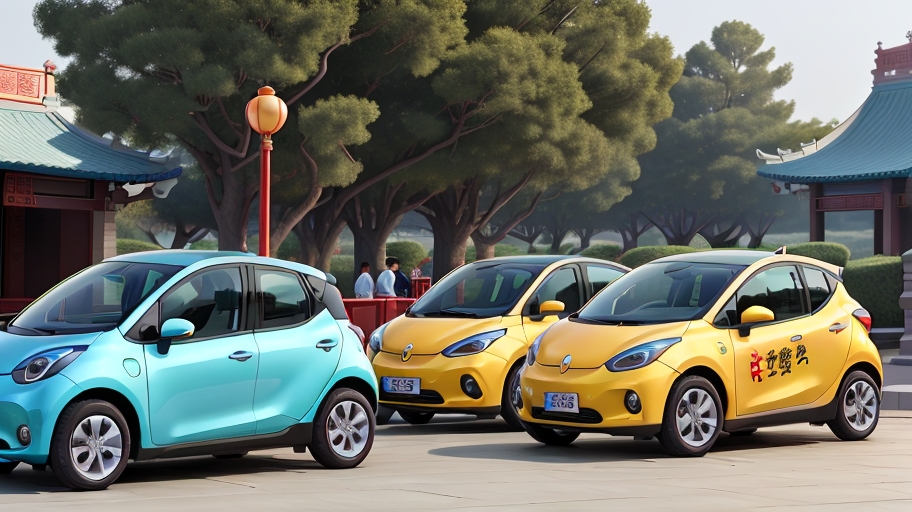Chinese automaker BYD (Build Your Dreams) is poised to overtake Tesla, the current frontrunner in the global electric car market.

Table of Contents
- Introduction
- BYD’s Rise in the Electric Vehicle Market
- Challenges for Tesla in the Chinese Market
- BYD’s Global Impact
- The Future of Electric Vehicles
- 🌐 Sources
Introduction
In the rapidly evolving landscape of electric vehicles (EVs), Chinese automaker BYD (Build Your Dreams) is poised to overtake Tesla, the current frontrunner in the global electric car market. This shift signals a significant milestone in the competition for dominance in the electric vehicle sector.
BYD’s Rise in the Electric Vehicle Market
-
BYD’s remarkable success in the electric vehicle (EV) market can be attributed to its strategic expansion initiatives. The company has pursued a multifaceted approach to expand its presence globally and tap into diverse market segments.
Strategic Expansion and Innovation
BYD’s ascent is attributed to its strategic expansion and relentless pursuit of innovation in the electric vehicle sector [1] . The company has made substantial investments in research and development, focusing on advancing battery technology and enhancing the performance and range of its electric vehicles.
Diverse Electric Vehicle Portfolio
BYD’s strategic expansion involves diversifying its product portfolio to cater to a broad spectrum of consumers [2] . The company manufactures an array of electric vehicles, including compact city cars, electric buses, and commercial vehicles. This diverse product lineup positions BYD as a comprehensive provider in the electric mobility space, appealing to various consumer preferences and industry needs.
Innovation in Electric Vehicle Technology
Innovation has been a cornerstone of BYD’s success in the electric vehicle market. The company has consistently invested in research and development to advance electric vehicle technology, with a particular focus on battery innovation and vehicle performance.
BYD has been at the forefront of developing cutting-edge battery technologies. The company’s commitment to improving energy density, extending battery life, and enhancing charging efficiency has played a pivotal role in making its electric vehicles more competitive. Advancements in battery technology contribute to increased range, faster charging times, and overall improvements in the performance of BYD’s electric vehicles.
Innovation extends beyond batteries to every aspect of BYD’s electric vehicles. The company places a strong emphasis on continuous improvement in vehicle performance, ensuring that its electric cars are not only environmentally friendly but also deliver a superior driving experience. Features such as enhanced acceleration, intuitive technology integration, and innovative design elements contribute to BYD’s reputation for producing high-quality electric vehicles.
Challenges for Tesla in the Chinese Market
While Tesla has been a dominant force in the electric car market, especially in the United States, it faces increasing competition in China, the world’s largest automotive market. BYD’s aggressive approach and understanding of the local market dynamics have posed challenges for Tesla [1] .
Moreover, Tesla has encountered regulatory hurdles and scrutiny in China, impacting its growth trajectory. BYD’s alignment with Chinese regulatory requirements has provided it with a competitive edge in navigating the complex Chinese market [3] .
BYD’s Global Impact
BYD’s influence is not confined to the Chinese market. The company has been actively expanding its footprint globally, establishing partnerships and collaborations to promote its electric vehicles on the international stage [4] . This global approach positions BYD as a formidable competitor to Tesla in the broader context of the electric vehicle industry.
BYD has actively established a presence in various countries, setting up subsidiaries, production facilities, and research and development centers. Notable regions of expansion include Europe, North America, and Southeast Asia. This global network enables BYD to participate in and contribute to the burgeoning electric mobility landscape on a worldwide scale.
Collaborations with international partners form a critical component of BYD’s global expansion strategy. These partnerships extend beyond geographical boundaries and involve joint ventures with established players in the automotive and technology sectors. BYD has strategically formed joint ventures with local partners in different countries. These collaborations not only facilitate regulatory compliance but also provide BYD with valuable insights into regional markets. Joint ventures serve as a mechanism for BYD to navigate complex international business landscapes and establish itself as a trusted player in diverse markets.
The Future of Electric Vehicles
As BYD continues to gain momentum, the dynamics of the electric vehicle market are undergoing a significant shift. While Tesla pioneered the widespread adoption of electric cars and remains a major player, BYD’s strategic initiatives and innovation herald a new era in the industry.
The competition between BYD and Tesla reflects the broader trend of increased global interest in electric vehicles. The success of these companies is indicative of the growing acceptance and demand for sustainable transportation solutions.
In conclusion, BYD’s trajectory to overtake Tesla as the world’s most popular electric car maker underscores the dynamism and fierce competition within the electric vehicle industry. As both companies strive for market leadership, their contributions to advancing electric vehicle technology will likely shape the future of sustainable transportation.
🌐 Sources
- China’s BYD to overtake Tesla as world’s most popular electric car maker
- BYD Auto
- Tesla faces scrutiny in China
- BYD’s Global Expansion
Disclaimer
The content of this article is a summary gathered from various online sources to ensure a comprehensive and nuanced representation of diverse viewpoints. However, the author cannot guarantee the absolute accuracy of specific statements presented. As such, the author disclaims any liability for errors, inaccuracies, or omissions in the content.
© 2023 digitalblackboard.io